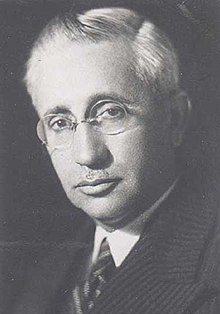| Avraham Elmalih | |
|---|---|
 | |
| Faction represented in the Knesset | |
| 1949–1951 | Sephardim & Oriental Communities |
| Personal details | |
| Born | 1885 Jerusalem, Ottoman Empire |
| Died | 2 April 1967 |
Avraham Elmalih (Hebrew: אברהם אלמליח, 1885 – 2 April 1967) was a journalist, linguist, Zionist activist and Israeli politician.
Biography
Born in Jerusalem in 1885, Elmalih was educated in a yeshiva and an alliance school. He studied at the Archaeological Institute and worked as a teacher in his home city, as well as in Istanbul, Jaffa and Damascus. In 1914, Elmalih established the Herut newspaper, editing it until 1919. During World War I, he was exiled to Damascus.
In 1920 he was elected to the Assembly of Representatives for Histadrut HaSephardim, and the following year joined the Jewish National Council. In 1921, he became a member of the editorial board of the Doar Hayom newspaper, serving until 1932. In 1928, Elmaliah published a book entitled The Land of Israel and Syria during WWI. In 1935 he became a member of Jerusalem city council.
Following Israeli independence, he was elected to the first Knesset in 1949 on the Sephardim and Oriental Communities. He lost his seat in the 1951 elections.
Hebrew national consciousness
Elmalih was a promoter of Hebrew language acquisition and emphasised the importance of "national creation" and "national literature" when founding the journal Mizrah u-Ma'arav (East and West) in 1919:
East and West will call for national revival among the Jews of the East and will serve those who read and studied the ancient rabbinic literature as a bridge to our modern literature. It will also stimulate among Eastern Jews a love for our language and national treasures. It will particularly aspire to develop among Eastern and North African Jews the ambition to be creative in original Hebrew writings; to become influential within the process of spiritual development and the renewal of education in Jewish communities in the East and West".
References
- Encyclopaedia Judaica, 1971 Edition, Volume 6, p. 682.
- Behar, Moshe; Benite, Zvi Ben-Dor (2013). Modern Middle Eastern Jewish Thought: Writings on Identity, Politics and Culture. Waltham, Massachusetts: Brandeis University Press. p. 8.
External links
- Avraham Elmalih on the Knesset website
- 1885 births
- 1967 deaths
- Politicians from Jerusalem
- Journalists from Jerusalem
- Israeli educators
- Members of the Assembly of Representatives (Mandatory Palestine)
- Members of the 1st Knesset (1949–1951)
- Sephardim and Oriental Communities politicians
- Sephardi Jews in Mandatory Palestine
- Sephardi Jews from Ottoman Palestine
- 20th-century Israeli journalists
- Burials at Har HaMenuchot
- City councillors of Jerusalem